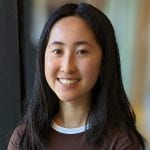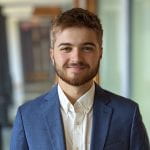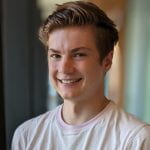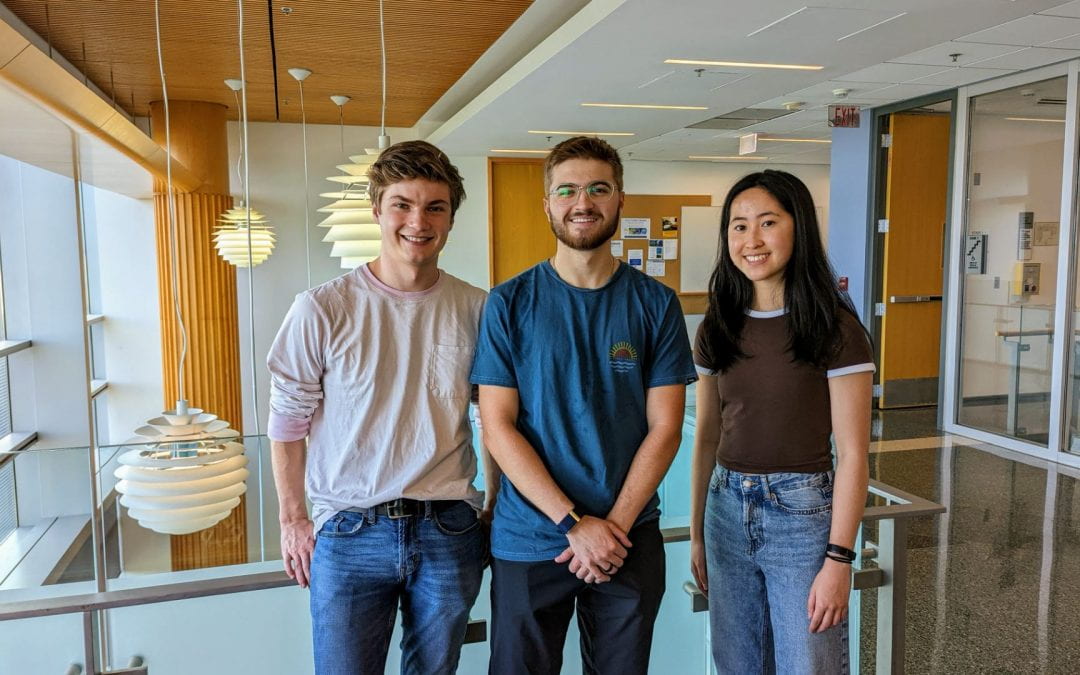Three Northwestern undergraduates, Izzy He, Connor Moore, and Sean Pascoe, were recipients of the 2022 Chemistry of Life Processes Institute (CLP) Summer Scholars Research Program Award. Each will receive $4,500 to spend the summer quarter working with a CLP faculty member in a multi-disciplinary science research lab.
“We are thrilled to welcome Izzy, Connor, and Sean into the CLP fold and believe this formative research experience will influence their professional path,” says Penelope Johnson, the Institute’s senior project coordinator of education and outreach. “It’s also fun for me to work with undergrads and offer them opportunities to meet other scientists on both campuses, as well as introduce them to the CLP graduate students from our T32 training grant. Since all of the students are in different labs, we create a community of researchers who teach each other and support one another. We are very proud of the work they are doing!”
In addition to pursuing interdisciplinary research in life sciences, chemistry, engineering, physics or math, awardees are required to present at the CLP Undergraduate Summer Research Forum in August and the Chicago Area Undergraduate Research Symposium in April 2023. They are also invited to participate in CLP-sponsored workshops throughout the year.
Recently, CLP spoke with awardees about their research projects, Summer Scholars experience and plans for the future.
IZZY HE
 Hometown: Pittsford, NY
Hometown: Pittsford, NY
Year: Rising Sophomore
Major: Biology
Minor: Data Science
CLP Mentor: Alfred L. George, Jr., MD (Pharmacology)
What is the focus of your CLP Summer Research Project?
Dr. George’s lab studies mutations in the ion channels of electrically excitable cells like neurons and cardiac cells. I will be studying KCNH1, a gene that encodes a voltage-gated potassium ion channel known as Kv10.1. Mutations in KCNH1 have been implicated in the development of rare neurodevelopmental disorders such as Zimmerman-Laband Syndrome and Temple-Baraitser Syndrome. I will use a technique called manual patch clamp to record the current and voltage relationships of these ion channels to determine the effects of two engineered mutations on the ion channel’s functional properties. The goal of my project is to eventually apply an old drug to see if it can return the mutant ion channels to a functionally normal baseline. If that’s the case, then this drug could potentially be repurposed as a novel treatment for people with KCNH1-associated disorders.
Why did you apply for the CLP Summer Scholarship?
After reading about the Summer Scholars program, I noticed that it offered the unique opportunity of giving a presentation at the end of the summer as well as preparing a poster or oral presentation for the Undergraduate Research Symposium in spring of next year. This made me very excited that the CLP would guide me on a long-term research journey, not just by funding an independent research project for this summer, but also by helping me set up a strong foundation to continue research in the future and become a better scientific speaker. The CLP itself is also prestigious and it’s exciting to get more involved with it.
Do you know yet what you want to do after graduation?
I’m not sure yet, but having been in this lab, I definitely want to continue biomedical research. So far, I’ve got to meet a lot of wonderful people from various backgrounds at Northwestern so I’m open to a lot of things.
CONNOR MOORE
 Hometown: Burlingame, CA
Hometown: Burlingame, CA
Year: Rising Junior
Major: Chemical Engineering
Minor: Computer Science
CLP Mentor: Guillermo A. Ameer, ScD (Biomedical Engineering)
What is the focus of your CLP Summer Research Project?
In my work with the Ameer lab, under Research Assistant Professor Dr. Ding, I am developing 3D-printed bioresorbable polymeric vascular stents. Cardiovascular and peripheral artery diseases cause plaque to build up in your arteries. The current procedure is to go in with a catheter through a blood vessel in your arm, wrist, or groin and use a balloon to expand the affected area breaking up the plaque and inserting a metal stent that holds the rigidity of the artery open and allows for blood flow. This procedure is super successful, but the problem is that you now have a foreign piece of metal in your body for the rest of your life. Your artery will never return to its original function.
We are developing stents that break down over time in your body and disappear, so your artery would return to normal function, which is super cool. Unfortunately, the lack of X-ray visibility of most polymer materials brings significant challenges when deploying and monitoring the stents inside the body. To address this, I’m specifically working on the development of a radiopaque polymeric stent by incorporating radiopaque particles. The high X-ray absorption of these particles drastically increases the X-ray visibility of the stent. Most of the work is optimizing the 3D printing conditions and determining the material’s potentially altered properties and functions. The goal is to allow the artery to resume completely normal function.
Why did you apply for the CLP Summer Scholarship?
It’s been amazing. I started in this lab in the spring and already had been doing this work. To be able to continuously work here over the summer was super awesome. The scholarship also allowed me to stay here off-campus in a house. That opportunity alone has been incredible. The events set up by Penelope been super cool. CLP held a lunch and ice cream social where we all got to hang out and say what we were doing. I’m also looking forward to going to CLP’s Core Crawl.
Do you know yet what you want to do after graduation?
I hope to do something related to biotech. Whether that’s industry or academia, I’m not positive yet, but currently, I’m just enjoying the research. As long as I’m enjoying it, I’ll stick with this and hopefully plan for the best.
SEAN PASCOE
 Hometown: Tucson, AZ
Hometown: Tucson, AZ
Year: Rising Junior
Major: Biology
Minors: Data Science and French
CLP Mentor: Thomas J. Hope, PhD (Cell and Developmental Biology)
What is the focus of your CLP Summer Research Project?
I proposed a data-driven type analysis project with Professor Tom Hope’s lab, a lab that is focused on basic science research related to HIV and the dynamics of infection and treatment on a cellular level.
The biggest barrier that we face in studying HIV is that there is an elusive latent period of infection during antiretroviral therapy (ART) where virus is undetectable in the blood and not able to be transmitted. However, when ART is interrupted, viral levels in the blood will rebound. It’s like the virus is hiding somewhere outside the circulatory system and we can’t use the same blood-based assays to figure out exactly what’s going on. To combat this, we analyze data from PET-CT scans, which give you a chance to look at the full organism during antiretroviral therapy and determine where virus is present one day, seven days, or 14 days, etc., after ART is stopped. Then, we can take tissue samples and use fluorescence microscopy, labelling or staining samples for specific proteins to get more of an idea of exactly what’s happening on a cellular level.
Why did you apply for the CLP Summer Scholarship?
During my first lab experience freshman year, I was looking for a work-study job and there was a communication sciences and disorders lab that needed an assistant. I ended up doing some lab work for them, but that wasn’t really what I wanted to study. In the course of that job, I stumbled upon a list of other labs at Northwestern and it opened my eyes to the many opportunities I have as an undergraduate here. After working with the Center for Quantitative Biology this past year, I decided to reach out to Professor Hope to learn more about biomedical research that interested me and began interacting with the lab. The CLP Summer Scholarship has given me the opportunity to pursue science this summer and see what I can do to help others via code written in RStudio.
Do you know yet what you want to do after graduation?
It might be too soon to tell. I plan on sticking with biology. Whether or not I become a biologist in some respect, who knows? But it’s something that I enjoy and it’s also a way of seeing the world that I think is helpful in any career.
by Lisa La Vallee
